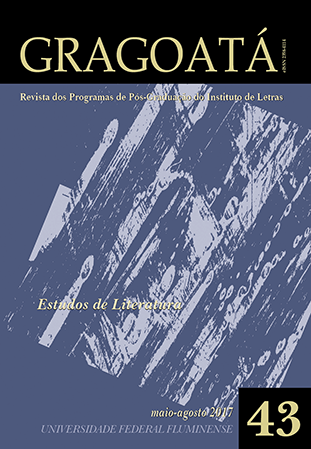A fluidez dos espaços em Fita Verde no Cabelo de Guimarães Rosa
DOI:
https://doi.org/10.22409/gragoata.v22i43.33503Palabras clave:
Fita Verde no Cabelo. Linguagem. Espaço.Resumen
O artigo investiga o texto Fita Verde no Cabelo, de Guimarães Rosa, e reflete a respeito da constituição do espaço na narrativa enquanto uma construção rica em componentes significativos para a compreensão do processo de amadurecimento da personagem. A apreensão do texto enquanto artefato da língua serve de base para o amadurecimento de outras concepções como a fenomenologia da imaginação, de Gaston Bachelard, e a perspectiva psicanalítica, que iluminam o texto de modo a deixar perceptível o percurso metodológico que se faz, em primeiro lugar, a partir da aldeia como espaço de indefinição que impulsiona e prende para si ao mesmo tempo; em segundo lugar, a reflexão cai sobre o bosque como espaço do sobejo; e, por último, considera-se a casa como espaço de centralidade em que o eu, no embate consigo mesmo e com o espaço, consolida-se pela experiência da morte. Como resultado dessa leitura, verifica-se a passagem de Chapeuzinho Vermelho à Fita Verde no cabelo como a reprodução de um processo de despojamento sofrido pela própria linguagem artística que parte de sua exterioridade, com todas as marcas de um texto preocupado com o dito e que, portanto, pede um leitor completo, inteiro, definido; e segue em busca de outras possibilidades de construção linguística, em busca de um interior da linguagem, de uma palavra que se faz laboratório de si mesma, onde os confrontos são inevitáveis e o leitor abandona qualquer forma de tranquilidade e passa a gozar da incompletude na convivência com a complexidade da leitura contemporânea.
---
DOI: http://dx.doi.org/10.22409/gragoata.2017n43a737.
Descargas
Descargas
Publicado
Número
Sección
Licencia
AUTORIZAÇÃO
Autores que publicam em Gragoatá concordam com os seguintes termos:
Os autores mantêm os direitos e cedem à revista o direito à primeira publicação, simultaneamente submetido a uma licença Creative Commons Atribuição 4.0 Internacional (CC BY 4.0), que permite o compartilhamento por terceiros com a devida menção ao autor e à primeira publicação pela Gragoatá.
Os autores podem entrar em acordos contratuais adicionais e separados para a distribuição não exclusiva da versão publicada da obra (por exemplo, postá-la em um repositório institucional ou publicá-la em um livro), com o reconhecimento de sua publicação inicial na Gragoatá.
A Gragoatá utiliza uma Licença Creative Commons - Atribuição CC BY 4.0 Internacional.











